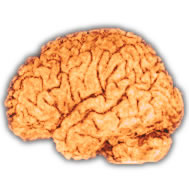The rise of the citizen scientist is transforming how we think and do science. Increasingly, scientists are turning to ordinary people to help out with their cutting-edge research. These so-called citizen scientists have the potential to help researchers study hugely complex problems, using millions of computers and billions of minds. Harnessing the creativity and ingenuity of citizen scientists has already enabled science to make great leaps forward, and this trend is likely to continue. We're finding that public engagement is now working both ways - scientists are listening to and learning from the public now more than ever. Put simply, Science needs YOU!
There are several ways in which the public can get involved:-
 1. The public can find new hypotheses and 'think outside the box'
1. The public can find new hypotheses and 'think outside the box'
The public can find new ways of thinking about difficult problems that scientists spend years puzzling over. Scientists can become very specialised in their chosen areas, and sometimes it is hard to 'see the wood for the trees'. Citizen scientists can use their unique perspective as patients or consumers to find new and innovative approaches to scientific problems. Professor Geoffrey Boulton FRS says 'citizen scientists can often think of enlightening questions no-one has thought about.'
Take, for example, the field of medical science. Researchers at Harvard have been using the public to help find the answer to the tricky question 'What do we not know in order to cure type 1 diabetes?' Type 1 diabetes is a disease where patients fall ill early on in life, due to problems with their blood sugar levels. The researchers threw open the debate to the general public, and had a phenomenal response. The multidisciplinary panel chose 12 ideas, and some of brightest were from everyday members of the public.
Companies can use this 'crowdsourcing science' technique too. BP scientists famously asked citizens to come up with ideas to help contain an oil spill in the Gulf of Mexico. According to BBC news, BP received over 31,600 suggestions from the public on how to plug the well or deal with the oil slick. Some of the weird and wacky ideas included using human hair, oil-decomposing bacteria, bombs and a device that distinctly resembled a giant shower curtain.
2. Using citizens' computing power
The sharing of computer power greatly increases the capabilities of researchers, and enables them to ask more complex questions. Scientists can make use of the surplus computing power of millions of computers around the globe by encouraging users to download a program which runs when the computer is idle. Perhaps one of the most well-known initiatives of this type is the SETI@home project. This searches for extraterrestrial intelligence by using internet-connected computers to download and analyse radio telescope data for patterns that might indicate intelligent life. Closer to home, medical science has also benefited from this revolution. IBM's World Community Grid collectively harnesses the power of millions of machines with idle processors to help make beneficial breakthroughs, including finding new drugs for the neglected tropical diseases like Leishmaniasis, as well more familiar microbes like malaria and HIV.
3. Using citizens' brain power
It is not only computer power that can be shared - brain power can be shared too! Scientists have found innovative approaches using human brainpower to solve some of their most complex problems. Foldit is a great game whereby you can solve puzzles for science. Gamers can use the site to predict the structure and function of important proteins. One group on the site, known as 'the contenders' managed to solve the structure of a protein that had been puzzling scientists for 10 years! So not only are these games good for your brain, they are also good for science! The solutions to your puzzles are analysed, and can be used in cutting edge research in finding new cures for devastating diseases, such as HIV/AIDS, cancer and Alzheimer's.
 Keen mathematicians can also contribute to the latest discoveries in maths. Polymath projects are open wiki pages where people can contribute their thoughts on mathematics problems.The first polymath project was started by the Fields medal winner Tim Gowers, who posted a complex mathematical problem on his blog and invited readers to try and solve it. Over 800 comments later, they had managed solved the problem. Michael Nielsen, author of 'reinventing discovery' describes it as 'the difference between driving and pushing your car'. More massively collaborative mathematical research projects are underway, so if you think you could be the next Einstein, have a go and find out!
Keen mathematicians can also contribute to the latest discoveries in maths. Polymath projects are open wiki pages where people can contribute their thoughts on mathematics problems.The first polymath project was started by the Fields medal winner Tim Gowers, who posted a complex mathematical problem on his blog and invited readers to try and solve it. Over 800 comments later, they had managed solved the problem. Michael Nielsen, author of 'reinventing discovery' describes it as 'the difference between driving and pushing your car'. More massively collaborative mathematical research projects are underway, so if you think you could be the next Einstein, have a go and find out!
Budding computer programmers can also get in on the act. If your geek skills are up to it, open source computer programming is revolutionizing the way we do science. Often computer programmers make their code freely available, and there are growing communities of programmers online that are happy to give beginners advice. Github is a brilliant website where promising programmers can upload their code which can then be shared around the world.
If you're into the 'eco' side of science, you can check out the Climate code foundation, which spends its energies making climate change software available to the public. They hope to rebuild public trust and support in climate data by making the software used in climate research freely available.
4. Citizens can collect data:
 Citizen scientists can also contribute to the scientific effort by collecting data. Not only is it a great way to gather an enormous amount of data, it is excellent way of engaging the public and getting them interested in science. There is a vast array of these projects underway, so there really is a project for everyone.
Citizen scientists can also contribute to the scientific effort by collecting data. Not only is it a great way to gather an enormous amount of data, it is excellent way of engaging the public and getting them interested in science. There is a vast array of these projects underway, so there really is a project for everyone.
Are you an avid birdwatcher? Then birdwatch for science! Counting birds can contribute to our knowledge of their distribution and how well their species are doing. Counting birds, plants, moths (practically anything) is a fun outdoor pastime, and can really benefit conservation around the world. For those insect fans, the adorably named 'lost ladybug project' may be the one for you.
If disease-hunting is more your thing, then you can chart disease outbreaks occurring in real-time. This data is particularly important during pandemics, and you can contribute your own data too. There are many of these projects available, and a quick search on Google will find you one.
5. Citizens can help evaluate data
One of the most important jobs of a scientist is evaluating scientific data. The public can help scientists by exploring ideas and coming up with new ways of testing and evaluating theories. In addition, talking through pseudoscience and presenting evidence is one of the most effective ways of engaging the public. Citizen scientists are capable of formulating their own opinions from the evidence, and it is infinitely preferable than being told what to think.
Skeptics in the pub is an initiative open to everyone where people can meet to discuss science, history, psychology, philosophy, investigative journalism and extraordinary claims of all types. They have been involved in debates ranging from homeopathy to climate change. These debates are always entertaining and lively, and are a great way of thinking through a tricky subject. Café scientifique is another project where people meet to explore the latest ideas in science in unusual settings, ranging from cafes to theatres. They'll also have an expert on hand to answer any tricky questions.
All UK non-scientists are taught science up to the age of 16 - just because they did not become scientists doesn't mean that we should lose their talent and creativity. Scientists are just starting to realise the full potential of our collective brainpower, and using it to answer bold and ambitious questions. The increased connectivity around the world has given us opportunities to engage the public on a much broader level than ever before. According to Nick Barnes from the Climate code foundation 'you don't need a lab to do science', and this is perfectly true. With mobile technology you can track oil spills on the bus, or work out important protein structures on the loo. Science affects us all in our daily lives, from disease to climate change - we're all in it together. So get involved, and be part of something incredible.
Are you interested in getting involved? Do you have any ideas how citizens can make a difference to science? Let us know by talking about it on our forum, or leave a comment below.










Comments
Add a comment